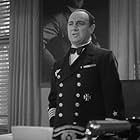ÉVALUATION IMDb
7,2/10
5,9 k
MA NOTE
Après l'invasion allemande en Tchéquie, les services de renseignement allemands et britanniques tentent de capturer le scientifique tchèque Axel Bomasch, inventeur d'un nouveau type de blind... Tout lireAprès l'invasion allemande en Tchéquie, les services de renseignement allemands et britanniques tentent de capturer le scientifique tchèque Axel Bomasch, inventeur d'un nouveau type de blindage.Après l'invasion allemande en Tchéquie, les services de renseignement allemands et britanniques tentent de capturer le scientifique tchèque Axel Bomasch, inventeur d'un nouveau type de blindage.
- Nommé pour 1 oscar
- 4 victoires et 3 nominations au total
Paul Henreid
- Karl Marsen
- (as Paul von Hernried)
Austin Trevor
- Capt. Prada
- (as Austen Trevor)
Kenneth Kent
- Controller
- (as Keneth Kent)
Frederick Valk
- Gestapo Officer
- (as Fritz Valk)
Edward Baxter
- Minor Role
- (uncredited)
Jane Cobb
- Minor Role
- (uncredited)
Histoire
Le saviez-vous
- AnecdotesAs of 2011, this movie has not been released in Germany.
- GaffesWhile on the train Randall, mentions England being led by Churchill. The film is set in September 1939 when the Prime Minister was Neville Chamberlain. At the time Winston Churchill was merely a back-bench MP until the 3rd Sept when he was appointed First Lord of the Admiralty and given a seat on the War Cabinet; he would not ascend to Prime Minister until May 1940.
- Générique farfeluPaul Henreid is listed as Paul von Hernried in the credits.
- Autres versionsThere is an Italian edition of this film on DVD, distributed by DNA srl, "TRENO DI NOTTE PER MONACO (Night Train to Munich, 1940) + ODD MAN OUT (Fuggiasco, 1947)" (2 Films on a single DVD), re-edited with the contribution of film historian Riccardo Cusin. This version is also available for streaming on some platforms.
- ConnexionsEdited into All This and World War II (1976)
- Bandes originalesDas Lied der Deutschen
(uncredited)
aka "Deutschland über Alles"
Music by Joseph Haydn
Variations played throughout
Commentaire en vedette
This film was made at a point of frustration and fear for the British. They had bumbled into a frightening war against a truly evil foreign government, and had watched helplessly as their ally fell. It is a mark of the strength of British character that this movie was made, complete with a healthy dollop of comedy in it (including self-parody). Basically the film acknowledges the treachery and evil of the Nazis and their collaborators (Paul Henried here), and the failure of the British to successfully account for it in the period of Chamberlain's government (Baldwin's previous government had tried to counter it but faced overwhelming pacifist spirit in the Labor and Tory Parties). Rex Harrison (aided by Basil Radford and Naughton Wayne) represent the Britain that pulls itself together to use the same deceit to snatch back what was lost.
As noted in several comments above, Radford and Wayne are Charters and Caldicott again, still traveling on continental trains, discussing cricket matches, and proving up to fighting the enemy if that enemy shows it's hands. Harrison looks almost dashing (complete with monocle) in his Nazi disguise outfit. He makes the comment about the Siegfried Line at one point...and nobody ever has explained it. The best single line belongs to Raymond Huntley, as a Nazi officer trying to understand whether the comment "This is a fine country we live in" was meant as a put down or not. After being left alone for a moment or two, he repeats it with different emphasis on "fine country". Then looking at the camera with complete honesty he says "This is a bloody awful country we live in." I am sure British audiences in 1940 fully agreed with Huntley.
As noted in several comments above, Radford and Wayne are Charters and Caldicott again, still traveling on continental trains, discussing cricket matches, and proving up to fighting the enemy if that enemy shows it's hands. Harrison looks almost dashing (complete with monocle) in his Nazi disguise outfit. He makes the comment about the Siegfried Line at one point...and nobody ever has explained it. The best single line belongs to Raymond Huntley, as a Nazi officer trying to understand whether the comment "This is a fine country we live in" was meant as a put down or not. After being left alone for a moment or two, he repeats it with different emphasis on "fine country". Then looking at the camera with complete honesty he says "This is a bloody awful country we live in." I am sure British audiences in 1940 fully agreed with Huntley.
- theowinthrop
- 19 févr. 2005
- Lien permanent
Meilleurs choix
Connectez-vous pour évaluer et surveiller les recommandations personnalisées
- How long is Night Train to Munich?Propulsé par Alexa
Détails
- Date de sortie
- Pays d’origine
- Langues
- Aussi connu sous le nom de
- In Disguise
- Lieux de tournage
- société de production
- Consultez plus de crédits d'entreprise sur IMDbPro
- Durée1 heure 35 minutes
- Couleur
- Rapport de forme
- 1.37 : 1
Contribuer à cette page
Suggérer une modification ou ajouter du contenu manquant

Lacune principale
What is the Spanish language plot outline for Night Train to Munich (1940)?
Répondre
































